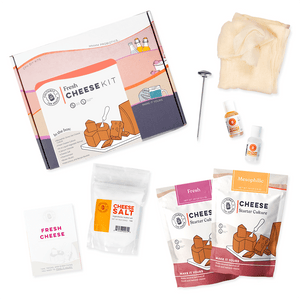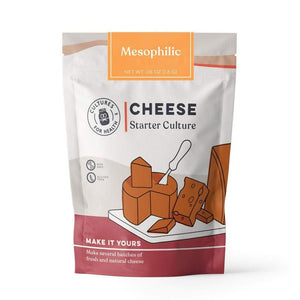
Cheese curds are a slightly different take on traditional hard cheeses. Since the curd is not pressed, it separates easily into slices or chunks, and lends itself to flavoring. The spicy chilies are a perfect offset to the creamy cheese.
20 minutes
160 minutes
5
INGREDIENTS AND EQUIPMENT AVAILABLE AT CULTURES FOR HEALTH
Fresh Cheese Making Kit

Fresh Cheese Making Kit
$45.99
Our most comprehensive choice, the Fresh Cheese Kit contains two starter cultures and supplies to make five different varieties of soft cheese - feta, cottage cheese, cream cheese, fromage blanc, and traditional quark. Kit contains a Mesophilic Cheese Culture, a Fresh Cheese Culture, calcium chloride, vegetable rennet, cheese salt, butter muslin, a thermometer, and an instruction and recipe card.
Packaging and Equipment in the kit may appear different than pictured.
Mesophilic Direct-Set Starter Culture

Mesophilic Direct-Set Starter Culture
$19.99
From cheddar, Colby, and Monterey Jack to Feta, Chevre, and more, you'll enjoy the flavor and variety of homemade cheeses made using this starter culture.
Cheese Salt

Liquid Vegetable Rennet

Liquid Vegetable Rennet
$7.99
Double-strength liquid vegetable rennet. Each bottle contains enough rennet to set (24) 2-gallon batches of cheese.
INGREDIENTS:
- 1 gallon whole milk
- 1/8 tsp. mesophilic starter culture
- 1/2 tsp. liquid rennet diluted in 2 Tbsp. cold water
- Cheese salt
- 1 can diced chilies, drained
- Cayenne pepper or red pepper flakes
INSTRUCTIONS:
- Heat the milk to 88°F using a water bath method in 98°F water. This should take about 15 minutes.
- Remove the milk from the water bath once it has reached temperature. Sprinkle the starter over the surface of the milk and allow it to rehydrate for 5 minutes. Then stir it in slowly with a whisk, using steady up-and-down motions. Cover and maintain the temperature at 88°F for 45 minutes to allow the milk to ripen.
- Add the diluted rennet and stir in using the same up-and-down motions used for incorporating the cultures. Replace the lid and maintain the temperature between 88° and 86°F. Leave the milk undisturbed for 40 minutes to allow it to set.
- Once you have a clean break, cut the curds into 1/2-inch pieces. Place the pot over medium-low heat, and bring the temperature of the curds and whey up to 102°F over about 1/2 hour, stirring frequently to shrink the curds to the size of peanuts. Cover and maintain the temperature for about 30 more minutes, stirring less frequently to prevent excess matting of the curds.
- When the curds are done, they should lump together when a handful of them are gently squeezed in your hand. Press the lump with your thumb. If they separate easily, they are ready. Cover the pot and allow the curds to settle to the bottom.
- Line a colander with damp butter muslin. Place it over a clean bucket or a bowl large enough to catch and save the whey. Pour the curds into the colander and allow them to drain for 10 minutes. Pour the captured whey back into the pot.
- Bring the whey back up to 102°F. Remove the cheesecloth from under the curds in the colander, suspend the colander of curds over the pot, and place the lid on top of it all. Maintain the whey’s temperature at 102°F for 10 minutes. This should cause the curds to melt into a slab.
- Flip the slab of cheese curds every 15 minutes for 1 hour, maintaining the temperature of the whey at around 98°F.
- The curd slab should look white and a bit shiny at the end of the heating / flipping period, like cooked chicken. Transfer the whole slab to a clean cutting board, and cut it into strips, like French fries. Place the strips into a bowl and toss with about 1 Tbsp. of salt until they are all thoroughly coated. Put the curds back into the colander and place the colander over a clean, empty bowl.
- Let the curds sit uncovered in the colander, to dry for about a day.
-
Place the curds in a bowl and mix in a dash more salt to taste, the chilies, and as much of the pepper as you want, according to your own spicy tolerance.
You can serve the cheese immediately, or put them into a resealable bag and store them in the refrigerator for up to 2 weeks.















